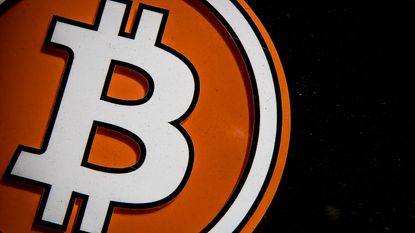Is bitcoin going mainstream, and should you buy in?
Bitcoin mania shows no signs of abating. And despite the scepticism of the world’s central banks, commercial banks and institutional investors are piling in. So should you buy bitcoin too? Saloni Sardana investigates.


Last week, US Federal Reserve chair Jerome Powell made his views on bitcoin clear: it’s “an asset for speculation”, one that “is essentially a substitute for gold rather than for the dollar”, Powell told the Bank for International Settlements’ digital banking conference. Nor is it “a useful store of value” because of its volatility.
Powell’s comments are perhaps unsurprising. You wouldn’t expect the governor of the world’s most important central bank to say: “rush out and buy bitcoin”. Yet his views are not necessarily shared by Wall Street, with the likes of BNY Mellon and Goldman Sachs taking bigger steps into the area of cryptocurrencies in general.
It’s little wonder that institutions are becoming more interested. Bitcoin has now been around since 2008; in that time it has survived several boom and bust phases, and in each boom phase, people have potentially made a lot of money.
Subscribe to MoneyWeek
Subscribe to MoneyWeek today and get your first six magazine issues absolutely FREE

Sign up to Money Morning
Don't miss the latest investment and personal finances news, market analysis, plus money-saving tips with our free twice-daily newsletter
Don't miss the latest investment and personal finances news, market analysis, plus money-saving tips with our free twice-daily newsletter
Today, despite all the scepticism, it remains trading close to its recent all-time high of $61,644, thanks to a search both for inflation hedges (given the scale of public debt and money being printed by central banks) and, for returns in a low-interest rate environment coupled with frothy equity and bond markets, points out Anthony Hardy, research analyst at Franklin Equity Group.
So are cryptocurrencies becoming mainstream – and should you invest?
Banks are turning bullish on crypto
Mainstream adoption of cryptocurrencies is growing fast. Since the start of the year, several big banks have embraced crypto. Goldman Sachs, for example, reintroduced plans to launch a cryptocurrency desk for futures trading.
It’s not alone. Just a few months after America’s oldest bank – Bank of New York Mellon – announced it will roll out a new digital custody unit later this year, Morgan Stanley became the first bank to give its wealth management clients access to three cryptocurrency funds, according to CNBC.
Meanwhile, in a 108-page report published in February (which came in for some criticism), Citigroup gave bitcoin a big endorsement, saying that it “may be optimally positioned to become the preferred currency for global trade”.
It is not just the banks who are increasingly endorsing crypto. Tesla’s Elon Musk started accepting bitcoin as payment for cars earlier this month, just a few weeks after Tesla shifted $1.5bn into bitcoin.
The crypto rally has also captured the attention of individual investors who view bitcoin as a potentially better hedge against inflation than traditional hedges such as gold, primarily because bitcoin has a fixed long-run supply of 21 million coins, compared to central banks’ ability to print as much fiat currency as they like.
The US recently approved a $1.9trn stimulus plan which market participants think may be seen as the tipping point for inflation to stage a comeback (and now Joe Biden’s administration is pushing for a further $3trn spending plan). And with the Fed signalling that it won’t raise rates until 2024 at the earliest, inflation is very much at the fore of investors’ minds.
Why bitcoin may not be the best hedge against inflation
But are people really buying bitcoin because they think it’s a good hedge against inflation? Bank of America doesn’t seem to think so. “Bitcoin has… become related to risk assets, it is not tied to inflation, and remains exceptionally volatile, making it impractical as a store of wealth or payment mechanism”, Bank of America’s commodity and derivatives strategist Francisco Blanch, said in a recent note, according to CNBC.
Economist Nouriel Roubini – renowned for his bearish views and a long-time critic of digital currencies – agrees. “If people were really worried about inflation they would diversify in a wide range of assets that are historical good hedges against inflation. That's not happening”, he says.
Another point is that, while bitcoin does have a fixed supply in much the same way other assets viewed as inflation hedges such as gold, it’s still possible to launch competing cryptocurrencies which can expand the market, argues Daniel Kern, chief investment officer at TFC Financial Management.
Should you invest in cryptocurrencies?
Discussions about cryptocurrencies can be quite polarised. True believers get very defensive, while ardent crypto critics act as though the whole thing is on the verge of collapse. We take more of a middle view.
Ignoring crypto seems unwise. It’s clear that digital currencies and the blockchain are of great interest to governments and central banks. And bitcoin has now managed to survive enough booms and busts to convince us that it’s not a flash in the pan. So investors should pay attention to the space and educate themselves on it.
In a recent issue of MoneyWeek magazine, Charlie Morris made the case for holding both bitcoin and gold as hedges against different stages of inflation – he believes they complement rather than compete with one another.
Equally, if you’re not an early adopter or particularly tech-minded, we wouldn’t worry too much. If crypto becomes significant enough to be considered an asset class in its own right (rather than an evolution of currencies, say), then institutional adoption will eventually lead to investment vehicles that are more easily accessible to private investors.
If you’re interested to learn more about bitcoin generally, then you can currently get a free beginner’s guide to bitcoin when you subscribe to MoneyWeek. Get the report, plus your first six issues, absolutely free here.
Saloni is a web writer for MoneyWeek focusing on personal finance and global financial markets. Her work has appeared in FTAdviser (part of the Financial Times), Business Insider and City A.M, among other publications. She holds a masters in international journalism from City, University of London.
Follow her on Twitter at @sardana_saloni
-
 Pension vs property: which option provides the best income for your retirement?
Pension vs property: which option provides the best income for your retirement?News With the cost of a comfortable retirement on the rise, future retirees need to weigh up which strategy offers the best returns. But is a pension a better bet than property?
By Henry Sandercock Published
-
 The industry at the heart of global technology
The industry at the heart of global technologyThe semiconductor industry powers key trends such as artificial intelligence, says Rupert Hargreaves
By Rupert Hargreaves Published
-
 Halifax: House price slump continues as prices slide for the sixth consecutive month
Halifax: House price slump continues as prices slide for the sixth consecutive monthUK house prices fell again in September as buyers returned, but the slowdown was not as fast as anticipated, latest Halifax data shows. Where are house prices falling the most?
By Kalpana Fitzpatrick Published
-
 Rents hit a record high - but is the opportunity for buy-to-let investors still strong?
Rents hit a record high - but is the opportunity for buy-to-let investors still strong?UK rent prices have hit a record high with the average hitting over £1,200 a month says Rightmove. Are there still opportunities in buy-to-let?
By Marc Shoffman Published
-
 Pension savers turn to gold investments
Pension savers turn to gold investmentsInvestors are racing to buy gold to protect their pensions from a stock market correction and high inflation, experts say
By Ruth Emery Published
-
 Where to find the best returns from student accommodation
Where to find the best returns from student accommodationStudent accommodation can be a lucrative investment if you know where to look.
By Marc Shoffman Published
-
 Best investing apps
Best investing appsWe round up the best investing apps. Looking for an easy-to-use app to help you start investing, keep track of your portfolio or make trades on the go?
By Ruth Emery Last updated
-
 The world’s best bargain stocks
The world’s best bargain stocksSearching for bargain stocks with Alec Cutler of the Orbis Global Balanced Fund, who tells Andrew Van Sickle which sectors are being overlooked.
By Andrew Van Sickle Published
-
 Revealed: the cheapest cities to own a home in Britain
Revealed: the cheapest cities to own a home in BritainNew research reveals the cheapest cities to own a home, taking account of mortgage payments, utility bills and council tax
By Ruth Emery Published
-
 UK recession: How to protect your portfolio
UK recession: How to protect your portfolioAs the UK recession is confirmed, we look at ways to protect your wealth.
By Henry Sandercock Last updated